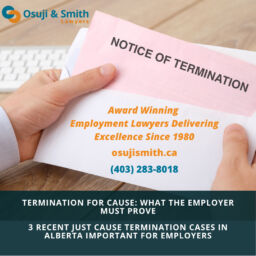What is Termination For Just Cause?
Terminating an employee is never easy. For a company to terminate an employee legally, fairly, and in the best interest of the company, many factors must be considered. The primary question is whether or not the termination is for just cause. The answer will affect:
- How the termination should be handled;
- What the employee is entitled to; and
- The required termination notice period.
What is Just Cause Termination?
 A just cause termination is a termination that is for a valid reason. It is allowed by law by meeting 2 criteria:
A just cause termination is a termination that is for a valid reason. It is allowed by law by meeting 2 criteria:
- There is a legal cause for the termination, and
- The employer followed the appropriate legal procedure for the termination.
A legal cause for termination involves proof of serious employee misconduct or illegal activity in the workplace, such that the employment relationship is irreparable. A just cause termination does not include unsatisfactory work performance or occasional lateness (unless there is a clear pattern with documented warnings).
Termination because of age, race, gender, or other personal factors is not termination for just cause.
Legally acceptable reasons for terminating an employee include:
- Drunkenness or being high at work
- Fraud or theft
- Violence or harassment in the workplace
- Repeated absence or lateness without reasonable excuse
- Insubordination or failure to follow employer instruction or policies
- Serious breach of the employment contract
Termination for just cause can be based on a single incident or a series of incidents and ongoing activity.
What is Without Cause Termination?
Employment isn’t a lifelong covenant between an employer and an employee. The law allows an employer to terminate an employee without cause as long as the employer provides the employee with reasonable notice or pay in lieu. Also, the termination must not violate Alberta Human Rights.
A few examples of legal without cause terminations include:
- The employee’s services are no longer required (for any reason);
- The employer is struggling financially or is adjusting due to a downturn in the economy;
- The employee’s performance at work is unsatisfactory yet doesn’t qualify as just cause;
- The employer is making changes to their company structure or operations; or
- The employer no longer deems the employee a good fit for the company.
To determine the reasonable notice period for termination without cause, many factors are considered. For more information about this, see Wrongful Dismissal & Reasonable Notice Period.
Why the Difference Between Just Cause & Without Cause Termination Matters
A just cause termination and a termination without cause or two legally distinct processes. If an employer uses the wrong form of termination, they are liable to a wrongful dismissal claim or other related claims.
A without cause termination requires the employer to provide the employee with reasonable notice or pay in lieu. If the termination is for just cause, the employer is not required to provide any notice or termination pay at all.
Employees who have been terminated for just cause may not be eligible for Employment Benefits (EI).
A just cause termination can be costly to the employee, but save the employer a lot of money. It may seem like a just cause termination is in the employer’s best interest. But keep in mind that an employer is required by law to provide proof of just cause. Failure to do so could result in costly wrongful dismissal claims and other related claims against them.
How to Determine & Prove Termination for Just Cause
A high burden of proof is placed on employers in Alberta for just cause terminations. It’s not up to the employee to disprove their just cause termination.
In addition to the cause for termination, the employer must also demonstrate that the termination considered the situation in context, including the employee’s record (including any disciplinary actions or investigations) and seniority in the company.
So how does an employer provide adequate evidence of just cause?
In addition to the reason for termination (like those outlined above), Alberta courts also consider factors like:
- The workplace culture;
- The type or nature of the employee’s actions;
- The employee’s position in the company;
- The timing of the employee’s actions (e.g. during or outside of work hours); and
- The nature of the employer’s business.
The most important factor in determining just cause termination, however, is the answer to this question:
- Do the employee’s actions or conduct in this situation make it impossible for the employment relationship to continue reasonably?
Providing evidence for a just cause termination is not an easy task especially when the cause is based on a series of smaller repeated issues. Employers benefit from obtaining legal advice from an employment lawyer before terminating an employee for just cause.
When to Hire a Lawyer for a Just Cause Termination
In Alberta, employment termination cases are reviewed individually. Each matter is determined on a case-by-case basis.
That said, legal just cause termination is rare. Even if an employer seems obviously justified in their termination, because of the stringency of the legal test to establish just cause, the employer may be unable to prove it.
It is always in the best interest of an employer to seek legal advice before terminating an employee for any reason.
Benefits of legal counsel in both just cause and without cause termination situations include:
- Reduce risk to the employer of wrongful dismissal and other claims;
- Avoid legal pitfalls of an erroneous termination;
- Find out what an employee is entitled to with regard to reasonable notice and/or severance pay
The team of employment lawyers at Osuji & Smith can review your situation to help determine if you’re dealing with a just cause termination or a termination without cause. We provide the legal advice and expertise you need for your own unique circumstances – for both employers and employees.



